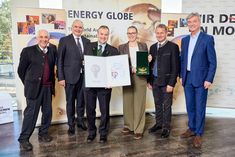Energy Globe Award
At the final of the Energy Globe Austria on 7.10.2022 the best environmental projects in 6 categories were awarded. In total, about 300 Austrian environmental projects participated this year. In the category Earth, the Office of the Provincial Government of Styria won the Medal of Honor with a research project coordinated by BOKU for a free and digitally accessible planning and consulting basis for forest management. After the opening by Federal President Van der Bellen, the award was presented in the web-based event by Provincial Governor Deputy Dr. Manfred Haimbuchner.
Within the framework of the research and development project "Dynamic Forest Typing - FORSITE" in Styria, a new scientific approach was chosen for the first time, where variable climatic conditions were taken into account in the classification and mapping of forest sites, the description of site units and the derivation of silvicultural measures. Within the framework of the project, a forest typing based on a GIS-supported geo-ecological stratification model for the entire forest area of Styria could be carried out in cooperation with the Office of the Styrian Provincial Government, the Department 10 Agriculture and Forestry and numerous partners.
In addition to basic geological data and the elevation model, digitally available site and climate data as well as additionally collected site and stand parameters were used as the data basis. For the forest type map to be created, it was possible to model thematic maps for the factors climate zone, water balance and base stage on the basis of the selectively available data and the available area data, which were then combined into forest types with a uniform factor combination and displayed on a digital site map. Regionalization of climate data for historical and future conditions allowed for "dynamic forest typing." In doing so, a model of site classification was derived to describe the sites that may form under current climate conditions and what changes can be expected for these sites under climate change. By using the data collected and generated in the project and considering the different climate scenarios, it was possible to model the soil water balance, the overall water balance, the heat balance, and the nutrient balance of each forest site dynamically - i.e., for different times in the future (by the end of the 21st century) - and thus to estimate the tree species suitability on the different forest sites and to describe the change on the forest sites. The overall suitability of a tree species is based on the combination of its auto-ecological suitability (suitability in terms of nutrient and water supply and temperature regime) and risk factors. With respect to climate change, silvicultural adaptation measures have been formulated to incorporate past experience and management recommendations into forest group descriptions. The digital maps and recommendations can assist forestry practitioners in making silvicultural decisions such as tree species selection.
All digitally available information can be accessed through the digital atlas of Styria: https://gis.stmk.gv.at/wgportal/atlasmobile/map/Forstwirtschaft%20-%20Landwirtschaft/dynWaldtypisierung.
At the University of Natural Resources and Applied Life Sciences, the Institute of Silviculture at the Department of Forest and Soil Sciences coordinated the project, the Institute of Forest Ecology at the Department of Forest and Soil Sciences, the Institute of Meteorology at the Department of Water, Atmosphere, Environment, and the Institute of Wood Technology and Renewable Resources at the Department of Materials Science and Process Engineering were involved as partners at BOKU. External partners were the Federal Research and Training Center for Forests, Natural Hazards and Landscape, the Institute of Earth Sciences at the University of Graz, the Office of Vegetation Ecology and Environmental Planning, ALPECON Wilhelmy Geowissenschaften GmbH, the Central Institute for Meteorology and Geodynamics, JOANNEUM RESEARCH Forschungsgesellschaft mbH and JR-AquaConSol GmbH. Details about the project consortium can be found in the FIS: https://forschung.boku.ac.at/fis/suchen.projekt_uebersicht?sprache_in=de&menue_id_in=300&id_in=12683.
The results of the research project were presented to around 550 interested parties at a symposium in Graz in March 2022. More information about the event and the presentations can be found here: https://www.agrar.steiermark.at/cms/ziel/151504582/DE/

